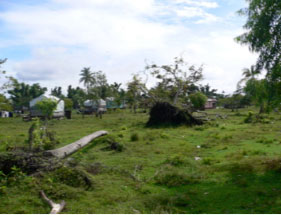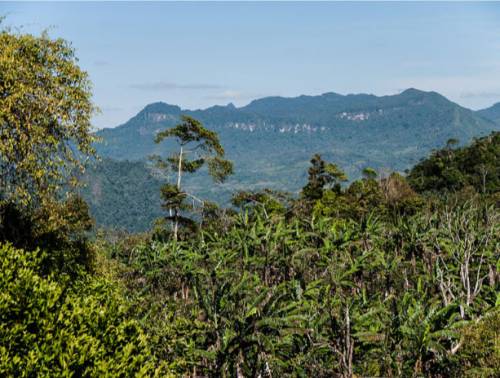A letter from Carlos Cardenas, serving in Nicaragua
August 2017
Write to Carlos Cardenas
Individuals: Give online to E550030 for Carlos Cardenas’ sending and support
Congregations: Give to D507540 for Carlos Cardenas’ sending and support
Churches are asked to send donations through your congregation’s normal receiving site (this is usually your presbytery).
Dear sisters and brothers,
I wish to greet you, hoping that the blessings of the Lord will always be with you and your families. I wish to dedicate this letter to an alarming concern that some show great concern for and others distance themselves from. I am referring to climate change and the protection of planetary life.
Although many experts in the world have recognized it as an absolute reality, and despite warnings from the Intergovernmental Panel on Climate (IPCC) that have led many other private and public scientific entities to conclude that “the game is over,” some world leaders still believe in second chances for the environment.
How does the everyday Nicaraguan perceive climate change? While there are those who hold cataclysmic perceptions and interpret it as divine punishment for human sin, there are also those who cautiously understand this to be the result of the role of society and humans in nature. The latter seems to be the one that every day gains more followers. The common person, and by that I mean peasants, farm laborers and blue-collar workers, and city people with more than a high-school education, do not need scientific indicators to understand that things are bleak.
If you go out to a community and begin a casual conversation on this topic, you will realize that peasants give you the clearest lesson on climate change that you will ever receive. Recently, I was visiting a home in the community Sanchez Chigue where the community has organized to cooperatively promote forest and wildlife protection through the education of local people, who are then prepared to take action. In the past, this community was well known for having thick tropical rainforests and some areas of tropical dry forest. Today, all that has been conserved is less than seven hectares (17 acres) of these kinds of forests, remembered with such melancholy as a type of land that used to cover much more area. People—in a sense human predators—who deforested this place still live in the community. The campaigns are directed towards this small segment of the population that constitutes a real threat to the remaining forest and the beautiful specimens of trees. These include trees such as Guanacaste (elephant-ear tree), Mahogany, Oak, Araguaney, Cedar, Nicaraguan Rosewood, and Rain Tree, some of which are 40 to 150 years old. I was very struck by an educational message in the national reserve “Las Cumbres” that said: “In this farm there is no wood, only live trees producing oxygen.”

 Forests in Nicaragua are being depleted at an alarming rate. According to the BBC, while 63% of Nicaragua was forested in 1983, if current rates of deforestation continue, that number will decrease to 25% by the year 2030.
Forests in Nicaragua are being depleted at an alarming rate. According to the BBC, while 63% of Nicaragua was forested in 1983, if current rates of deforestation continue, that number will decrease to 25% by the year 2030.
I was invited to have breakfast with a family of that community that works to protect their local forests and discuss their concern for the climate. Mr. Santiago Sanchez states that peasants have recognized and accepted climate change for more than 20 years. After Hurricane Mitch in October 1998, they observed changes in the singing and migration pattern of birds, flowering and production of many species of fruit trees, and the chirping of cicadas. They noticed that there was a noticeable disappearance of certain varieties of fruits, grains, and smaller mammals. They saw that the rainy season that signified the coming winter was less evident. And they experienced the unpredictability in the production of crops and drastic drops in the yields of grains. In essence, even before international scientific organizations such as German Watch and the IPCC characterized climate change definitively, Nicaraguan peasants had defined their own paradigm of climate change, noting these unmistakable signs as indicators of what climate change was causing.
Global warming is only a symptom of a sickness that we can see in environmental crises that exceed our capacity for resilience and weaken our immunological strength. These crises or outbreaks—be they hurricanes, floods, earthquakes, tsunamis, landslides, volcanic erruptions, etc.—plague us. And the great problems that this change in the climate has brought us are water crises, soil deterioration and desertification, and the threat of food security in the affected communities.
Action by Churches Together (ACT Alliance) receives support from Presbyterian Disaster Assistance (PDA) of the Presbyterian Mission Agency. Together with other PC(USA) partners, ACT Alliance accompanies these communities, sharing with them humanitarian, ecumenical, and Christian beliefs about climate justice as part of the climate change paradigm. The Christian entities that form part of the ACT Alliance Forum of Nicaragua hold fast to this paradigm of climate change.
We thank presbyteries and congregations as well as private donors for the support they give us with their prayers and material contributions, without which it would be impossible to reach these families with the timely support demanded during emergencies, some resulting from climate change.
May the peace of our Lord be with you, your congregations, and your families!
Carlos Cardenas
Mission Co-Worker, PC(USA)
Assigned to CEPAD, the Nicaraguan Council of Protestant Churches
Latin American and Caribbean Regional Representative of PDA
![]() You may freely reuse and distribute this article in its entirety for non-commercial purposes in any medium. Please include author attribution, photography credits, and a link to the original article. This work is licensed under a Creative Commons Attribution-NonCommercial-NoDeratives 4.0 International License.
You may freely reuse and distribute this article in its entirety for non-commercial purposes in any medium. Please include author attribution, photography credits, and a link to the original article. This work is licensed under a Creative Commons Attribution-NonCommercial-NoDeratives 4.0 International License.